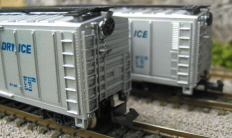Enter Your Sort/Filter Criteria:
* Many cars have had multiple importers/vendors over the course of their production history. In particular, European-made cars from the early days of N scale (Roco, Lima, Rivarossi, et al) hopped from vendor to vendor like so many fleas in a dog pound. In order to help collectors identify a particular car, I have done my best to provide index entries for each individual vendor of a given model. However, if you're more interested in just seeing "what's out there" (as opposed to "who sold what"), you can use the "Compressed Index" feature. This will compress multiple index entries for the same model into a single entry (with the importer/vendor simply listed as "various").
A note on "variations" -
Many older cars had minor variations from one production run to the next. IE, two supposedly identical box cars (from the same manufacturer / seller) might have their ends reversed (brake wheel on the "A" end of one car, brake wheel on the "B" end of the other car). I'm told that these variations were simply due to carelessness in the way the molds were set up for a given production run (IE, unintentional). And as such, I am not going to try to document them all here (life's too short).

A note on "build dates" -
Each index entry for a given model lists a "first built" date. These dates represent when a given prototype first entered service (more or less), and will hopefully help modelers decide if a particular car fits in with the era they're trying to model. Naturally, given the somewhat organic nature of railcars (vis'a'vis their manufacture and sale to different railroads, rebuilds / modifications and ultimate retirement from service), these dates are more guideline than rule. But generally speaking, if you take the "first built" date and then add 40 years, you should get a ballpark idea of when a given car might've been used. For greater accuracy, I'd recommend researching the specific railroad(s) you're interested in modeling. Yes, I'd love to provide more in-depth prototypical data here, but simply researching the actual models has turned out to be job enough for one man.
Many thanks to the countless modelers who've contributed to this effort. And special thanks to Charlie Vlk, George Irwin, and Todd Treaster for going to extra mile in helping me out (not to mention putting up with me and all my annoying questions).
